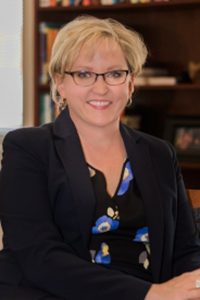Quick response helps adjust clinical training for nursing students during COVID-19

 Many weeks ago, as the novel coronavirus was first emerging in the United States with a cluster of cases on the West Coast, the UNC Charlotte School of Nursing began preparations to support its students in the event COVID-19 came to North Carolina. With 112 students set to graduate in May, finding a way to help nurses-in-training meet requirements for clinical training hours was a priority for School of Nursing Director Dena Evans and her team. As a result, the impact on students has been managed.
Many weeks ago, as the novel coronavirus was first emerging in the United States with a cluster of cases on the West Coast, the UNC Charlotte School of Nursing began preparations to support its students in the event COVID-19 came to North Carolina. With 112 students set to graduate in May, finding a way to help nurses-in-training meet requirements for clinical training hours was a priority for School of Nursing Director Dena Evans and her team. As a result, the impact on students has been managed.
The school reached out to multiple vendors to locate the best product for undergraduate and graduate students, ultimately purchasing technology from Laerdal and DxR Clinician. Due to these pre-planning efforts, when some clinical agencies began to turn students away because of COVID-19, UNC Charlotte was able to transition immediately to virtual simulation to ensure students would meet the clinical requirements of a variety of approval and accrediting agencies.
“We kept our students in clinical for as long as we possibly could; however, when we were at a point when we knew the remaining clinical hours could be completed by simulation, as allowed by the Board of Nursing, and the American Association of Colleges of Nursing, we were able to easily, and rather seamlessly, transition to virtual simulation,” said Dr. Evans.
“I feel like even though this is a big learning curve for both students and faculty we are all supporting each other during this time,” said student Haley Shriner. “The faculty have been understanding and have been working diligently, many staying up late to make sure we get our hours in.”
The North Carolina Board of Nursing (NCBON) does not mandate a specific number of clinical hours, except a required 120 hour focused care experience that UNC Charlotte conducts in students’ final semester. Students were able to complete around 75% of these hours before the transition to virtual simulation. The remaining hours are being completed through virtual simulation.
“We are very fortunate to have four Certified Healthcare Simulation experts on faculty who have worked tirelessly to ensure that students receive the best possible simulated experiences,” Evans said. “While direct clinical care hours are the preference, simulation provides students the opportunity to engage in well-constructed and meaningful clinical experiences designed to help meet course and program outcomes.”
Pre-licensure students and the SON continue to work with clinical partners to re-engage students enrolled in Advanced Practice Registered Nursing (APRN) programs as soon as possible. Discussions are underway with Atrium and Novant to allow APRN students to work in primary care clinics and engage in telehealth. This will allow students to continue to earn direct patient care hours.
NCBON also recently reinstated “Graduate Nurse” status, which allows prelicensure nursing graduates to enter the workforce in a temporary status under the supervision of a registered nurse. Once testing sites reopen, graduates will be able to complete testing requirements such as fingerprinting and criminal background checks, pass the NCLEX-RN exam and earn their license.